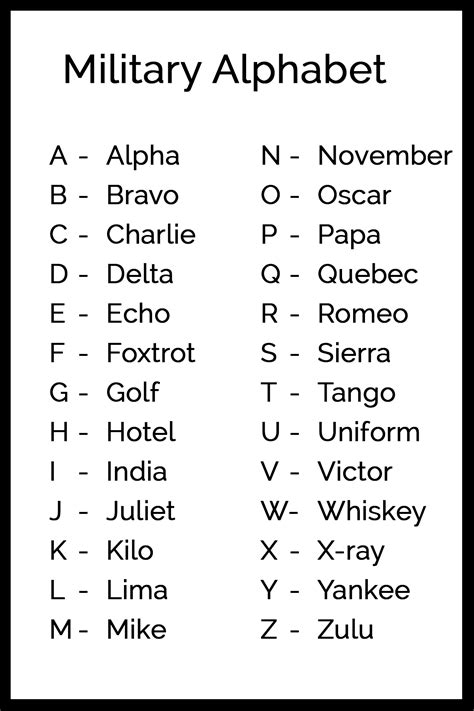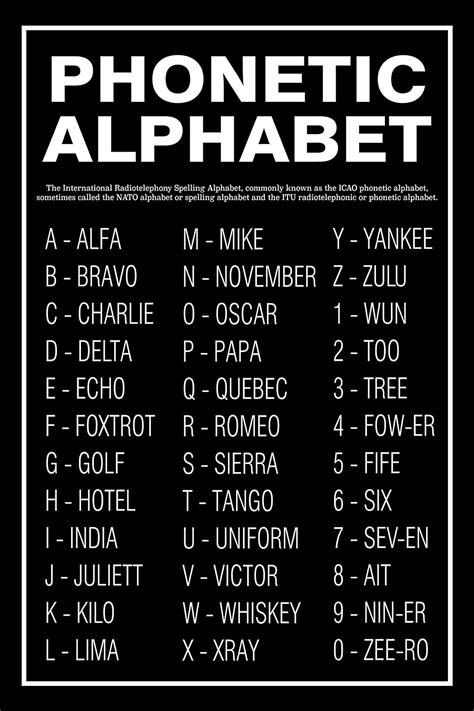Master the Military Phonetic Alphabet in 5 Easy Steps

What is the Military Phonetic Alphabet?

The Military Phonetic Alphabet, also known as the NATO phonetic alphabet, is a standardized system used to clearly communicate letters and numbers over radio and phone communications, particularly in situations where standard letter pronunciation may be unclear. This alphabet is widely used by military personnel, law enforcement, and other organizations to ensure accurate and efficient communication.
Why is the Military Phonetic Alphabet Important?

The Military Phonetic Alphabet is crucial in situations where clear communication is a matter of life and death. For example, in military operations, it’s essential to clearly communicate coordinates, call signs, and other critical information to avoid confusion and ensure successful missions. In addition, the alphabet is also used in aviation, maritime, and other industries where clear communication is vital.
Step 1: Learn the Basics

To master the Military Phonetic Alphabet, start by learning the 26 code words that correspond to each letter of the alphabet. The code words are carefully chosen to be distinct and easy to pronounce, even in noisy environments. Here is the complete list of code words:
| Letter | Code Word |
|---|---|
| A | Alpha |
| B | Bravo |
| C | Charlie |
| D | Delta |
| E | Echo |
| F | Foxtrot |
| G | Golf |
| H | Hotel |
| I | India |
| J | Juliet |
| K | Kilo |
| L | Lima |
| M | Mike |
| N | November |
| O | Oscar |
| P | Papa |
| Q | Quebec |
| R | Romeo |
| S | Sierra |
| T | Tango |
| U | Uniform |
| V | Victor |
| W | Whiskey |
| X | X-ray |
| Y | Yankee |
| Z | Zulu |

Step 2: Practice, Practice, Practice

Once you’ve learned the code words, practice reciting them in sequence. Start with the first few letters and gradually work your way through the entire alphabet. Try to practice regularly, even if it’s just for a few minutes each day. You can use flashcards or online resources to help you practice.
Step 3: Learn to Use the Alphabet in Context

The Military Phonetic Alphabet is not just used to communicate individual letters; it’s also used to communicate words and phrases. Practice using the alphabet to spell out common words and phrases, such as your name, address, and phone number. This will help you become more comfortable using the alphabet in real-world situations.
Step 4: Master Numbers and Special Characters

In addition to letters, the Military Phonetic Alphabet also includes code words for numbers and special characters. Here are the code words for numbers 0-9:
| Number | Code Word |
|---|---|
| 0 | Zero |
| 1 | One |
| 2 | Two |
| 3 | Three |
| 4 | Four |
| 5 | Five |
| 6 | Six |
| 7 | Seven |
| 8 | Eight |
| 9 | Nine |
There are also code words for special characters, such as:
| Character | Code Word |
|---|---|
| . (period) | Stop |
| , (comma) | Comma |
| ? (question mark) | Question Mark |
| ! (exclamation mark) | Exclamation Mark |
Step 5: Test Your Skills

To ensure you’ve mastered the Military Phonetic Alphabet, try taking a quiz or testing your skills with a friend or family member. You can find online resources or create your own quiz using flashcards or a worksheet. Practice communicating using the alphabet, and try to use it in real-world situations, such as when communicating with a friend or family member over the phone.
📝 Note: It's essential to practice regularly to become proficient in using the Military Phonetic Alphabet. Try to practice at least once a week to reinforce your learning.
What is the purpose of the Military Phonetic Alphabet?

+
The Military Phonetic Alphabet is used to clearly communicate letters and numbers over radio and phone communications, particularly in situations where standard letter pronunciation may be unclear.
How do I practice using the Military Phonetic Alphabet?

+
Practice reciting the code words in sequence, start with the first few letters and gradually work your way through the entire alphabet. You can use flashcards or online resources to help you practice.
Is the Military Phonetic Alphabet only used by the military?

+
No, the Military Phonetic Alphabet is also used by law enforcement, aviation, maritime, and other industries where clear communication is vital.
By following these 5 easy steps, you’ll be well on your way to mastering the Military Phonetic Alphabet. Remember to practice regularly and test your skills to ensure you’re proficient in using the alphabet. With time and practice, you’ll become more comfortable using the Military Phonetic Alphabet in real-world situations.